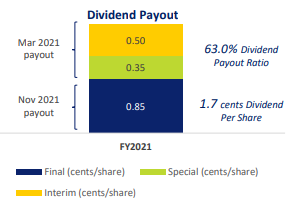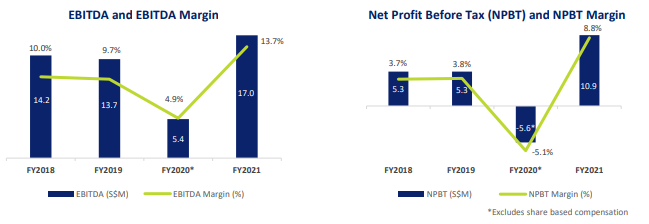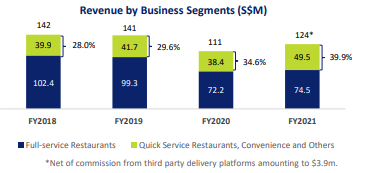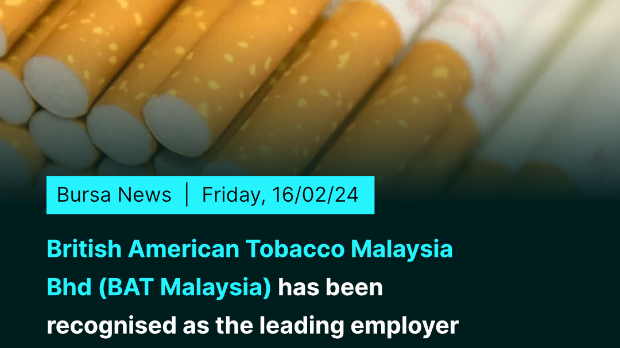10 in 10 With RE&S Holdings - Food for Life
MQ Trader
Publish date: Tue, 02 Nov 2021, 03:41 PM
Company Overview
RE&S is a multi-concept owner and operator of food and beverage outlets in Singapore and Malaysia that provides customers with authentic Japanese cuisine and dining experiences. Its portfolio comprises over 20 distinct brands ranging from fine dining to family-style and convenience restaurants. It has a network of over 70 F&B outlets, a corporate headquarters at Tai Seng which houses the corporate office and central kitchen, and a procurement office in Japan. Link to StockFacts company page
1. Describe RE&S’s Financial Performance Over the Past Few Years.
- FY2021 saw a turnaround in the Group’s performance with a $10.9m profit before tax. This represents an 8.8% Net Profit Before Tax (NPBT) margin, which contrasts with the -5.1% in FY2020, and the 3.8% in FY2019. FY2020 was particularly challenging for the Group as the year was impacted by major store renovations and COVID-19.
- While footfall to our outlets in FY2021 continued to be affected by the pandemic measures, the Group’s swift onboarding of multiple brands to major delivery platforms led to an increase in delivery sales. In addition, the Group’s continued strategy to expand its presence in the Quick Service Restaurant, Convenience and Others (QSR) segment yielded positive results with improved profitability.
2. Could You Elaborate on RE&S’s Brand Portfolio?
- RE&S manages over 70 outlets with 20 brands spanning across a broad spectrum of Japanese dining experiences – from fine-dining and family restaurants to food kiosks and retail outlets. All new brands and RE&S concepts are committed to deliver quality, value and a sincere level of service that is intrinsic to Japanese hospitality.
- Since our listing in 2017, we have been growing the QSR segment by expanding existing brands and creating new brands. QSR offers several advantages, including reduced labour reliance, increased speed of serving customers and a highly scalable business model that allows us to grow rapidly and operate efficiently with higher margins.
3. How Is the Group’s Revenue Split Across Business Segments?
- The Group’s business operations are located primarily in Singapore. Year-on-year, the group’s strategy to expand its brand presence in the QSR segment is gaining traction. Revenue contribution from the QSR segment has been increasing steadily from 29.6% in FY2019 to 39.9% of total revenue in FY2021.
4. How has COVID-19 affected RE&S operating conditions and what measures have been put in place to mitigate the impact?
- Group size limitations and work-from-home arrangements have impacted traffic to our restaurants significantly, with outlets in CBD and office areas remaining more affected. When dine-in was prohibited, we had to pivot quickly to delivery and takeaway business only. On the labour front, manpower shortages were exacerbated as a result of COVID-19 related travel restrictions.
▪ At RE&S, contactless ordering and eQueue systems was introduced for greater ease of mind. We exercised prudent cost controls and quickly adjusted our business to adapt to the new norm. Besides immediate measures such as increasing our brands’ visibility on the major delivery platforms, we also explored midterm plans including the creation of new concepts such as Yakiniku-GO that emphasizes on affordability and is less labour-intensive. Our goal is not just to tide over the pandemic, but to emerge stronger and more resilient.
5. In the recent press release, the company mentioned that ‘The Group will continue to revamp existing outlets, introduce new concepts and grow its presence in the Ready-toEat market.’ Could you elaborate more on this?
- The expansion of the QSR segment includes the launch of new concepts such as Shabu-GO which opened at NEX in October 2021. Aside to the QSR segment, Full-Service Restaurants (FSR) remain a key profit contributor at over 60% of the Group’s revenue. Established brands like Ichiban Boshi and Ichiban Sushi will continue to be rejuvenated with store renovations, service improvement projects, and new marketing activities.
- To meet the rising demand for Ready Meals and to future-proof the business, our research & development teams have been creating new products that are delivery-friendly in every way – from menu to packaging and logistics. Our marketing team has also been expanding its digital capabilities and aggressively increasing our social media presence. Meanwhile, our central kitchen is being enhanced to generate higher volume, with a focus on delivering fully assembled meals.
6. What Do You Think Are Some Key Drivers or Trends in the F&B Industry in the Near Future?
- On the supply end, we can expect further tightening of the labour market, with rising manpower costs coupled with the difficulty of hiring, training and retaining Singaporeans. Restaurants like us will need to think of how to automate processes and find more efficient ways of operating.
- On the demand side, online ordering will continue growing strongly and become a way of life in the postCOVID era.
7. What Are Some of the Risks for the Business and How Do You Manage Them?
- Two significant risks for our business relate to Food Safety and Supply Chain. To mitigate the first, we established food safety operating standards based on SS590 and ISO22000 Food Safety Management System. Training on basic food hygiene is provided to staff, and cleanliness of production floor, kitchens and outlets are maintained at all times. Bacterial testing for food products is carried out by in-house Quality Assurance or accredited third party laboratories. Regular checks are conducted to ensure that equipment such as chillers and freezers are well maintained and fully-functioning at all times. Expiry dates of ingredients are also monitored very closely.
- To manage Supply Chain risks, alternative ingredients are identified, and several suppliers are maintained for the major category ingredients. Procedures are put in place to ensure sufficient stock is held in warehouses in order to prevent out-of-stock situations. In addition, supplier evaluation is performed on a yearly basis.
8. How does the group retain customers with more restaurants shifting their marketing strategies online?
- One of our key marketing strategies is the digitalisation of our loyalty programme which currently boasts close to 200,000 members. A Customer Relationship Management (CRM) system allows us to embark on targeted marketing. With greater understanding of our customers’ preferences, we can then better curate our communications and engage more meaningfully with customers.
9. Sustainability and ESG have increasingly been a key focus, how is the Group committed to sustainability?
- Management understands that focusing solely on financial performance is not sufficient to achieve a sustainable business in the long-term. The Group is committed to work closely with its stakeholders to better understand their concerns and ensure that their interests are protected.
- We ensure that the core values of our business partners are aligned with ours in terms of integrity, accountability, and environmental protection before any contractual appointments are made. To ensure accountability and transparency in carrying out our business activities and sustainability efforts, we maintain a system of effective compliance and governance regimes. Conscious efforts are made to engage our stakeholders (including customers, employees, investors, the government) through formal and informal channels to communicate the Group’s sustainability efforts and to solicit feedback.
- Likewise, the Group continually seeks ways to reduce the environmental impact of our products and services whilst maintaining the highest level of quality. Since September 2018, one of our brands, Gokoku Japanese Bakery, had initiated a Bring Your Own Bag (BYOB) scheme in which a $0.10 off total bill discount is given to customers who bring their own bags. The launch of our CRM system in 2020 also allowed us to reduce paper usage as physical vouchers and loyalty cards were replaced by its digital counterparts.
10. Why Should Investors Take a Closer Look at RE&S? Notes
- RE&S has a high dividend payout ratio and a low priceto-earnings ratio. Management believes that our robust business fundamentals accompanied by our strong cash flows, places the Group in a favourable position for future growth.

10 in 10 – 10 Questions in 10 Minutes with SGX-listed companies
Designed to be a short read, 10 in 10 provides insights into SGX-listed companies through a series of 10 Q&As with management. Through these Q&As, management will discuss current business objectives, key revenue drivers as well as the industry landscape. Expect to find wide-ranging topics that go beyond usual company financials. This report contains factual commentary from the company’s management and is based on publicly announced information from the company. For more, visit sgx.com/research.
For Company Information, Visit Www.res.com.sg
Click Here for Slides to the 2021 Annual General Meeting
More articles on SG Market Dialogues
Created by MQ Trader | Jul 17, 2024
Created by MQ Trader | Jul 09, 2024
Created by MQ Trader | Jun 26, 2024
Created by MQ Trader | Jun 19, 2024
Created by MQ Trader | Jun 11, 2024
Created by MQ Trader | Jun 10, 2024
Created by MQ Trader | Jun 05, 2024
Created by MQ Trader | May 29, 2024




















